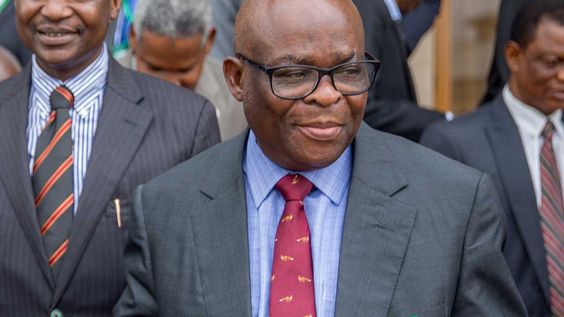Headlines
Ex-CJN Onnoghen Seeks to Overturn CCT Judgment

Former Chief Justice Onnoghen is seeking to overturn the CCT judgment that removed him from office. Discover the reasons behind his appeal and its potential impact.
Justice Walter Onnoghen, the former Chief Justice of Nigeria (CJN), is set to continue his legal fight against the Code of Conduct Tribunal’s decision that led to his dismissal from office in 2019. This will take place on Tuesday, August 20th, 2024 at the Court of Appeal located in Abuja.
Since April 2019, the suit has been filed at the Court of Appeal.
The ex-leader of the Nigerian judiciary is petitioning the Court of Appeal to nullify and overturn the CCT verdict given against him on April 18, 2019, citing multiple reasons.
Justice Onnoghen, represented by his lead counsel Adegboyega Awomolo SAN in appeal CA/ABJ/375 & 376 & 377/2019 seeks to have his conviction nullified based on lack of jurisdiction, bias and violation of fair hearing.
The only respondent in Onnoghen’s appeal is the Federal Republic of Nigeria.
OBASANJONEWS has just come across a hearing appeal notice titled “CA/ABJ/375 & 376 & 377/2019 between Justice Onnoghen and FRN”.
The above-mentioned issue is scheduled for a hearing on Tuesday, August 20th, 2024 at 9:00 am in the Abuja Division of the Court of Appeal. Kindly be informed.
Kindly be advised that this notice is intended for a hearing.
During his tenure as head of the judiciary in Nigeria, Onnoghen was found guilty by the Code of Conduct Tribunal on six counts for violating the code of conduct for public officials. These charges were brought against him by the federal government and resulted in a conviction in 2019.
The Chairman of the CCT, Danladi Yakubu Umar, issued a lead judgment mandating that Onnoghen be immediately removed from his position as CJN.
He had been deprived of all his previous positions by the Tribunal, including those of Chairman for both the National Judicial Council (NJC) and Federal Judicial Service Commission.
Read Also: CJN Summons Judges Over Contradictory Rulings in Kano Emirate Conflict
In addition, the tribunal directed that Onnoghen’s five bank accounts and funds not disclosed in his asset declaration form submitted to the Federal Government agency known as Code of Conduct Bureau (CCB) be seized.
Despite Onnoghen’s suspension since January 25, 2019 and subsequent resignation on April 4, the tribunal still decreed his ousting from his roles as Chief Justice of Nigeria and chairman for both the National Judicial Council and Federal Judicial Service Commission.
Unhappy with the CCT verdict, Onnoghen took his case to the Court of Appeal in Abuja in 2019 and presented 16 reasons why he believed that his conviction by the Tribunal should be overturned.
He argued that the Danladi Umar-chaired CCT panel made a legal mistake and caused him to suffer an unfair trial by not rejecting jurisdiction over the six charges laid against him, among other grievances.
According to him, it was necessary for the CCT Chairman to step down from overseeing his trial.
Onnoghen submitted a request to cancel his conviction and nullify the ruling for forfeiting his assets, as well as release him from any accusations brought against him in all seven of his reliefs.
Onnoghen cited several specific errors in the CCT’s ruling, contending that he held a position as a judicial officer when the charges against him were brought on January 11th, 2019; thus rendering him exempt from being tried under the authority of an inferior tribunal.
According to Nganiiwa v. FRN (2018) 4 NWLR (Pt.1609) 30, the National Judicial Council (NJC) is exclusively authorized at points 340 and 341 to discipline the Appellant for misconduct, not any lower tribunal.
In the case of FRN V. Sylvester Nwali Nguta with charge No: CCT/ABJ/01/2017, the lower tribunal upheld the decision previously made by Court in FRN Nganjiwa v. FRN on 9th January 2018. As a result, Justice Ngwuta was acquitted and discharged from all charges brought against him as he is solely subject to discipline under the National Judicial Council due to his position as a judicial officer.
The National Judicial Council is the only authority with jurisdiction over serving judicial officers like the appellant, and it exceeds that of lower tribunals.
The Motion on Notice submitted on January 14th, 2019 to challenge jurisdiction should be granted in all relevant aspects as it seeks to prevent the lower tribunal from engaging in unnecessary and futile activity.
The Appellant’s request for the chairman to excuse himself from future proceedings due to a real possibility of bias was wrongly dismissed by the lower tribunal, resulting in a miscarriage of justice.
The Appellant claims that the lower tribunal’s chairman displayed bias towards him due to comments made during the proceedings and how they were carried out.
Despite the CCT’s findings, Onnoghen asserted that he did not confess to failing to declare his assets from 2005 during his time as a Supreme Court Justice. He clarified that he only acknowledged omitting the declaration for 2009 because it slipped his mind at the time.
Onnoghen has contested the directive to seize his assets by arguing that he obtained them through lawful means. He refutes paragraph three of section 23 in the CCB act which permits asset confiscation only for those gained fraudulently.
He criticized the prosecution for not bringing Denis Aghanya, whose petition initiated the charges against him, to appear before the tribunal.
Onnoghen asserted that his conviction should not have been based on allegations which he claimed did not constitute any offense.
The ex-CJN requested that the Court of Appeal grant several orders in relation to the CCT judgment, including a declaration that the tribunal has no authority to preside over this case and an instruction for its Chairman to have disqualified themselves from any involvement.
Onnoghen sought a court order to nullify his conviction, revoke the forfeiture of assets ordered by the Tribunal and clear him from all charges.
